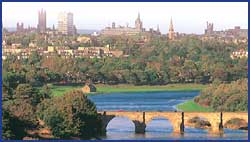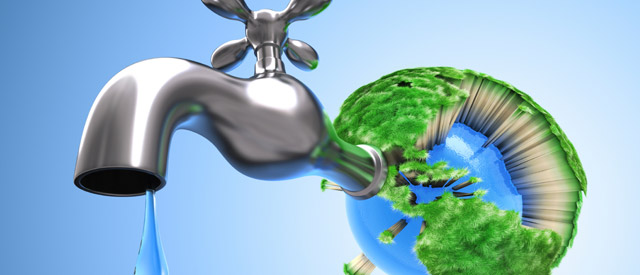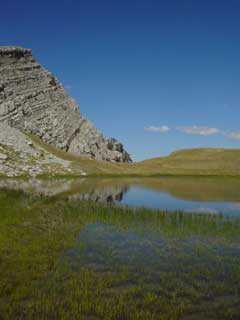 A Network for water resources protection in Tunisia
A Network for water resources protection in Tunisia
Tunisia is witnessing a rapid increase in population that is exceeding 10 million people, which led to more pressure on water resources. All you have to do is to go through the Majrada River, one of the biggest rivers in Tunisia, which crosses the country from the western frontiers (with Algeria) to the Mediterranean coast, to discover where many cities and towns are throwing their garbage. The work done by environmental protection agencies helped reduce the pollution caused by factories, the main pollutant agent of the Majrada River which pours out all its water, and the garbage, in the sea during the winter.
In fact, the phenomenon of environment pollution is not confined to the Majrada valley. It concerns several areas of the country. But, through lack of money, the Tunisian authorities were unable of controlling sources of pollution, and had recourse to the European Union financial support and expertise. In 2007, the National Agency for Environment Protection (ANPE) developed a mechanism for coordination between committees concerned with water pollution, in order to strengthen their role and improve their means of control.
In 2008, the ANPE acquired an itinerant laboratory for inspecting the level of water pollution in Northern areas, in addition to a laboratory established in the area of “Mrouj”, south of Tunis. These two laboratories became a logistic base for conducting surveillance operations. Except that two additional laboratories are needed in order to cover the center and the south of the country. Thanks to the EU support, Tunisia was able to buy these laboratories and provide training sessions for local employees on water pollution analysis issues, within a plan drawn up by Tunisians under the title of "COPEAU", a French acronym that stand for "Network of water pollution control".
In 2000, the EU had launched a plan called "Life Pays Tiers" that aims at providing support to institutions dealing with environmental issues in the Mediterranean and Baltic countries. Life Pays Tiers intends as well to improve environment protection and develop these institutions. In 2006, the EU agreed to fund 16 new environmental projects to be implemented in its neighboring states. Total investment budget reached 10 million Euros, among which 60% are provided by the EU. Projects were about essential environmental issues, such as waste management, climate pollution prevention, sustainable tourist areas development, and alignment of Mediterranean neighbors to EU environment protection legislative standards. Within the framework of this plan, EU funding amounted to 38 million Euros for the period 2000-2004, and 40.3 millions Euros for 2005-2006.
New water management system
Tunisia and Southern Mediterranean countries were some of the beneficiaries of these projects. Mohamed Ben Hassine is in charge of the Water resources protection program in Tunisia. In an interview with Al-Hayat Newspaper, he said that “this strategy falls under the objectives drawn up in order to guarantee efficient management and protection system for water resources". It’s expected to be achieved in June 2010. For her part, environmental expert at the EU Delegation in Tunis, Giulia Buscosi, explained that the EU allocated 448 thousand Euros in form of grant over a period of three years for the implementation of this project. The rest of the funding was allocated by the Tunisian government (332 thousand Euros) as well as by the research center “Aquapole” at the Belgian University of Liege.
Firstly, the project produced guidelines about water pollution control in Tunisia. These guidelines were approved by all national concerned parties. In an interview with Al-Hayat, an expert of water pollution said that “analysis and inspection operations used to be done separately, without coordination between concerned parties. Today, everybody is referring to a common system.” He also explained that his colleagues have participated in training sessions in Belgium, which promoted expertise and know-how exchanges between Tunisia and Wallonia.
In the guidelines validation framework, existing itinerant laboratories controlled 33 receivers, after making 5882 laboratory tests between January 2007 and June 2009. Successful control activities revealed the efficiency of the water pollution control guideline produced by the ANPE and the criteria on which it is based. It also helped experts of the agency to identify the sources of the pollution and environment deterioration, and transfer information to institutions concerned by water resources sector.
Secondly, the country will benefit from the establishment of two additional itinerant analysis laboratories that provide immediate results. The new laboratories’ equipments are connected to a central computer that facilitates enriching the database system. Laboratories also include other standard measurement that allows immediate analysis of heavy materials and chlorophylls, and these operations used to be done in other laboratories. From that point, we can say that new equipments helped to establish the basis of an independent analysis system and increased the speed of decision making in case of severe pollution issue.
Raising awareness
More than that, the ANPE organized an awareness campaign around the importance of controlling water pollution. The agency published two annual reports in 2007 and 2008, in addition to two newsletters on the results of control operations. These publications were distributed to the public and concerned institutions in Tunisia, through printed copies and Internet. According to M. Ben Hassine, it is expected that this program, which successfully reached its objectives, will encourage other Mediterranean countries to implement such efficient networks of water pollution protection, in order to guarantee water quality for their inhabitants.
| Contact information |
Samira Al-sadfi. - Tunis, Al-Hayat
|
|---|---|
| News type | Inbrief |
| File link |
http://www.eurojar.org/en/euromed-articles/network-water-resources-protection-tunisia/7390 |
| Source of information | EUROJAR |
| Keyword(s) | water resources protection |
| Subject(s) | METHTODOLOGY - STATISTICS - DECISION AID , NATURAL MEDIUM , PREVENTION AND NUISANCES POLLUTION |
| Relation | http://www.semide.net/countries/fol749974/country108068 |
| Geographical coverage | Tunisia |
| News date | 16/02/2010 |
| Working language(s) | ENGLISH |
 you are not logged in
you are not logged in





